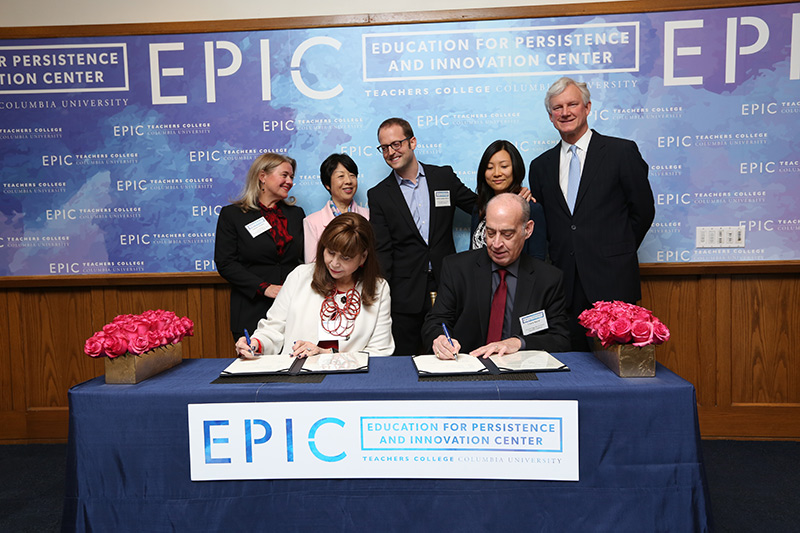Teachers College has launched the Education for Persistence and Innovation Center (EPIC), a new, interdisciplinary research and development center that will study failure across a wide variety of disciplines and test theories about how to use it as a catalyst for innovation and success.
”Based at TC and other schools at Columbia University, EPIC is directed by Xiaodong Lin-Siegler, Professor of Cognitive Studies in TC’s Department of Human Development, whose groundbreaking 2016 study, published by the American Psychological Association and funded by a large research grant from the National Science Foundation, found that high-school students may improve their science grades by learning about the personal struggles and failed experiments of great scientists such as Albert Einstein and Marie Curie.
Xiaodong Lin-Siegler
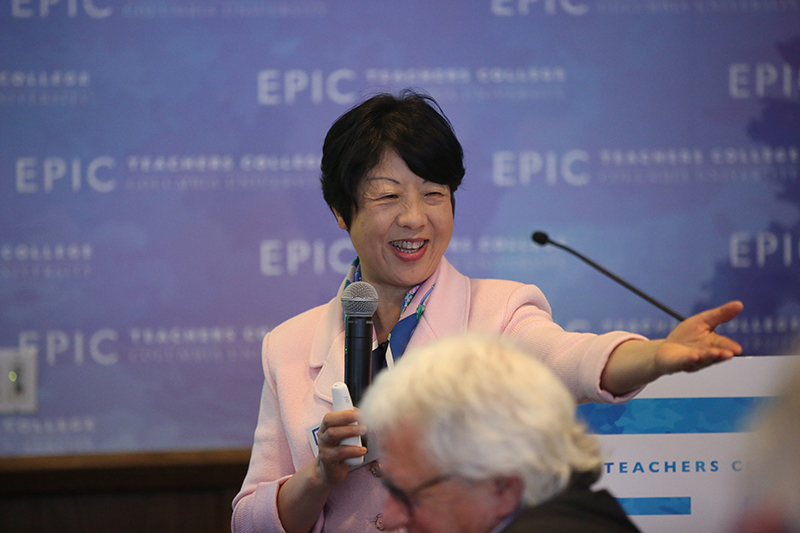
SAFE SPACE Lin-Siegler said she feels privileged to “work at an academic institution that encourages daring scholarship and original thought.”
At a launch event for EPIC held at the College on April 17th, TC also presented its inaugural EPIC Achievement Award to businessman and education philanthropist Dr. James S.C. Chao, founder of Foremost Group, one of the world’s leading shipping and transportation companies. Chao was joined by three of his daughters: Elaine Chao, U.S. Secretary of Transportation, who later introduced a discussion of the family's history; May Chao, a successful businesswoman; and Angela Chao, current Chairman and CEO of Foremost Group and President of Foremost Foundation.
EPIC is funded by Weiming Education Limited, a leading provider of private schools in China; the Alvin I. & Peggy S. Brown Family Charitable Foundation, Inc.; the National Science Foundation; and the Carnegie Corporation of New York.
The study of failure’s role in learning, growth and success “is an enterprise so intuitively right...that it is almost baffling that it hasn’t been taken up more widely.”
— Susan Fuhrman
“The opening of a new center is always a very special occasion at TC,” said President Susan Fuhrman at the signing ceremony for EPIC. TC’s great research hubs always “tackle issues of paramount concern to society,” Fuhrman said, and faculty members who direct them are leaders in their fields – but Lin-Siegler “is now taking her place in another hallowed TC tradition: she is pioneering an entirely new field of inquiry.” Indeed, the study of failure’s role in learning, growth and success “is an enterprise so intuitively right” Fuhrman added, “that it is almost baffling that it hasn’t been taken up more widely.”
James Chao

HE HAD A DREAM Chao was a poor farm boy, but he set his sights on studying in the United States.
And Thomas Bailey, who will succeed Fuhrman as TC’s President in July, said he is particularly excited about EPIC because of his work as the founding director of the TC’s Community College Research Center.
“No demographic is more persistent than community college students,” Bailey said “I have never seen students who are more eager to learn or more grateful to pursue postsecondary education. We owe it to community college students to make sure they have the learning and career opportunities they came for – and I am very optimistic that the work of EPIC will contribute to their success.”
EPIC’s goals are to inspire people to persist and triumph over adversity; to help them channel frustration and use negative emotions constructively; to identify effective strategies for overcoming failure; and to learn how organizations can help employees “fail successfully.”
Lin-Siegler said she feels privileged to “work at an academic institution that encourages daring scholarship and original thought,” calling TC “a welcoming environment for somebody like me who has failed often.” Though her own career path might appear smooth, Lin-Siegler said, she was in fact rejected by three graduate schools – including TC; initially failed to get the post-doctoral position she wanted; and received a string of “no thank yous” before her study on failure was finally published. Eventually she came to realize that such experiences are universal, but that parents and schools don’t teach young people how to learn and grow from failure.
Hao Lin
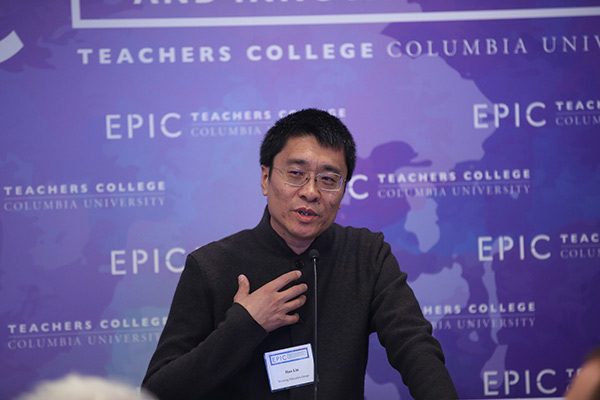
PRACTICAL APPLICATIONS Weiming Education's Hao Lin said that Lin-Siegler’s work on failure is particularly intriguing in light of the high risk that failure carries in China and the United States because "we both have had so much success in recent times.”
Lin-Siegler said that EPIC’s goals are to inspire people to persist and triumph over adversity; to help them channel frustration and use negative emotions constructively; to identify effective strategies for overcoming failure; and to learn how organizations can help employees “fail successfully.” In their first major project, Lin-Siegler and EPIC Associate Director Stuart Firestein, former Chair of the Department of Biological Sciences at Columbia, will interview a group of Nobel laureates about their experiences with failure (Lin-Siegler and Firestein hosted a major conference at TC on failure in December 2017.)
Weiming Education Limited founder and President Hao Lin said he was honored to build on “the longstanding relationship between China and Columbia,” noting that TC prepared great Chinese educators such as Zhang Boling, later Chair of China’s National Advisory Council, and President of Nankai University, and Tao Xingzhi, founder of Nanjing’s famed Morning Village Normal School. Lin-Siegler’s work on failure is particularly intriguing, he said, because “to learn about failure is to better face failure” – and right now, in both China and the United States, failure carries high risks “because we both have had so much success in recent times.”
Chuck Harab, Executive Director of the Alvin I. and Peggy Brown Charitable Foundation, said that both of the foundation’s late founders “not only stressed the importance of supporting meaningful and innovative education endeavors throughout their lives – they also made lifelong learning a central part of their lives.
Chao Family
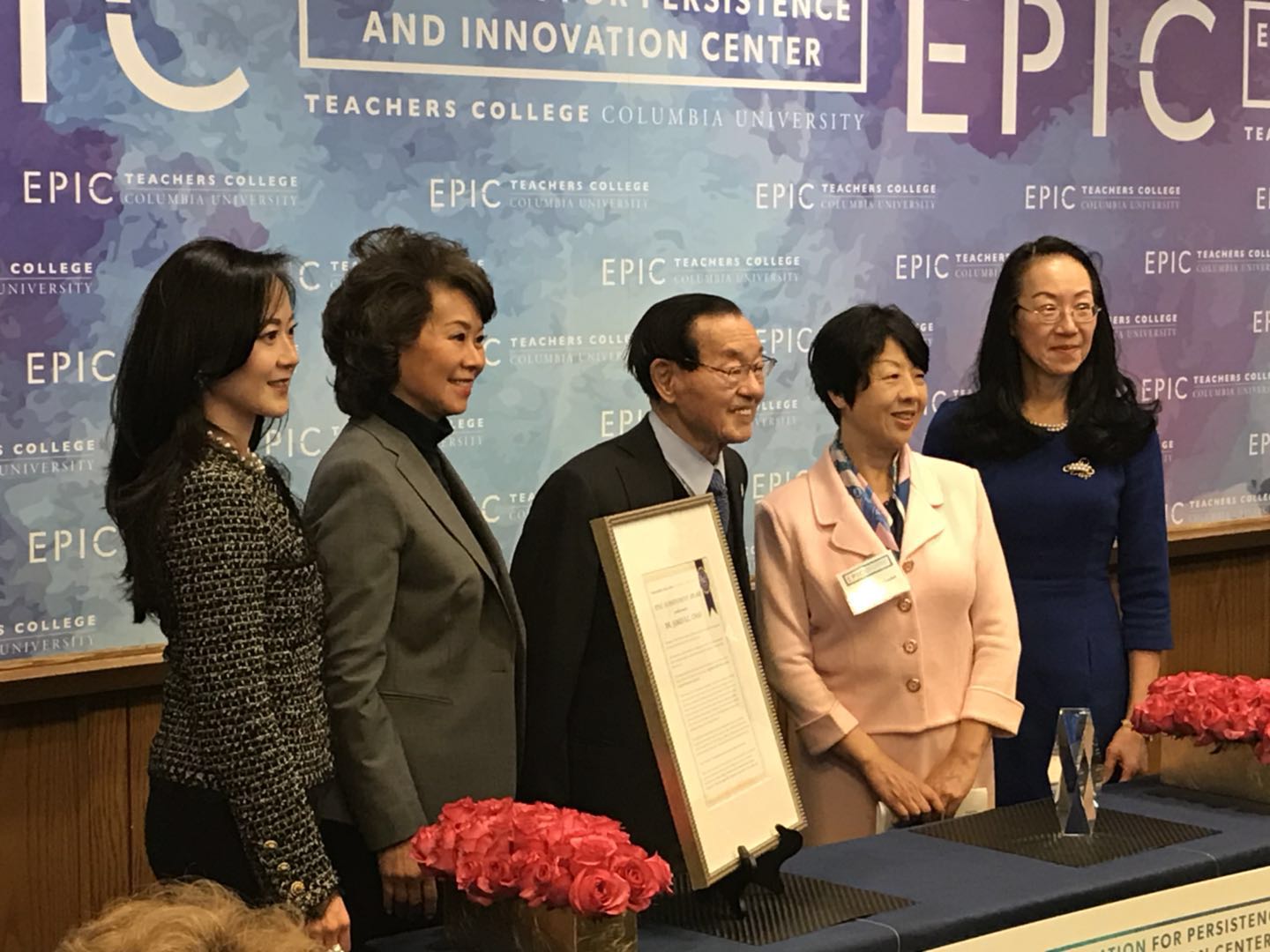
SELF MADE From left: Angela Chao; Elaine Chao; James S.C. Chao; TC Professor Xiaodong Lin; and May Chao.
“I know Alvin Brown would have loved this project, because he never saw people who struggled to find their place in society as ‘failures,’” Harab said. “Rather, he referred to them as ‘temporarily unsuccessful’ people who just needed to be taught, challenged and inspired to persevere and ultimately to prevail.”
“Alvin Brown would have loved this project, because he never saw people who struggled to find their place in society as ‘failures.’ Rather, he referred to them as ‘temporarily unsuccessful’ people who just needed to be taught, challenged and inspired to persevere and ultimately to prevail.”
— Chuck Harab
The EPIC Award, inaugurated at the launch ceremony, honors “the exceptional accomplishments and societal contributions of an individual who has displayed both the courage to overcome adversity and the charter to share personal stories of failure that teach and inspire others.” James Chao, whom TC Board Chair William Rueckert called “the ideal first recipient,” grew up in a poor farming village in China before making his way first to Taiwan and then the United States, where he founded Foremost Group, which he still serves as honorary Chairman.
“Before coming here, I was a farm boy,” Chao said. “We didn’t have a library or a computer, but I had a dream to go to the U.S. and study at Columbia University.”
But “life is never straightforward,” and Columbia would only allow him to audit courses – “which was a big disappointment, but still served my purpose.” Encouraged by the dean of St. John’s University, Chao persevered, earning a master’s at St. John’s in management, moving his wife and daughters to the United States and founding Foremost Group.
Expert Panel
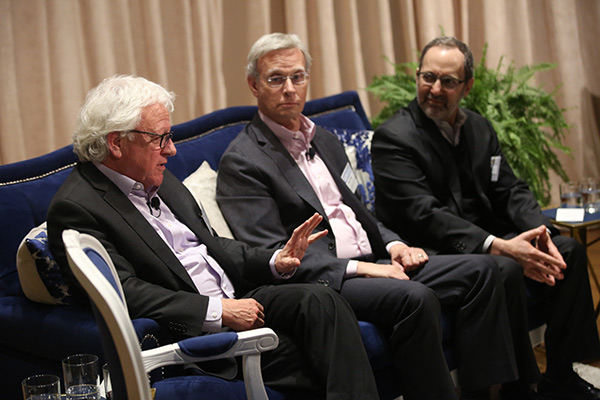
TALKING IT THROUGH Firestein, Siegler and Weiner discussed the value of failure in different fields.
Following the signing ceremonies, Lin-Siegler led a panel discussion in Milbank Chapel about failure that included Firestein, who has written widely on failure’s intrinsic importance to scientific research; Robert Siegler, Teresa Heinz Professor of Cognitive Psychology at Carnegie Mellon University and incoming Schiff Foundation Professor of Psychology at Teachers College; and Jonathan Weiner, Maxwell M. Geffen Professor of Medical and Scientific Journalism, Columbia University.
But first, the audience listened as Chao discussed his life and career with his daughters. Asked whether his Chinese accent has ever hindered his success, Chao demonstrated that humor is another key asset in handling failure.
“I’m a country boy,” he said. “Even in China, I have an accent.”
